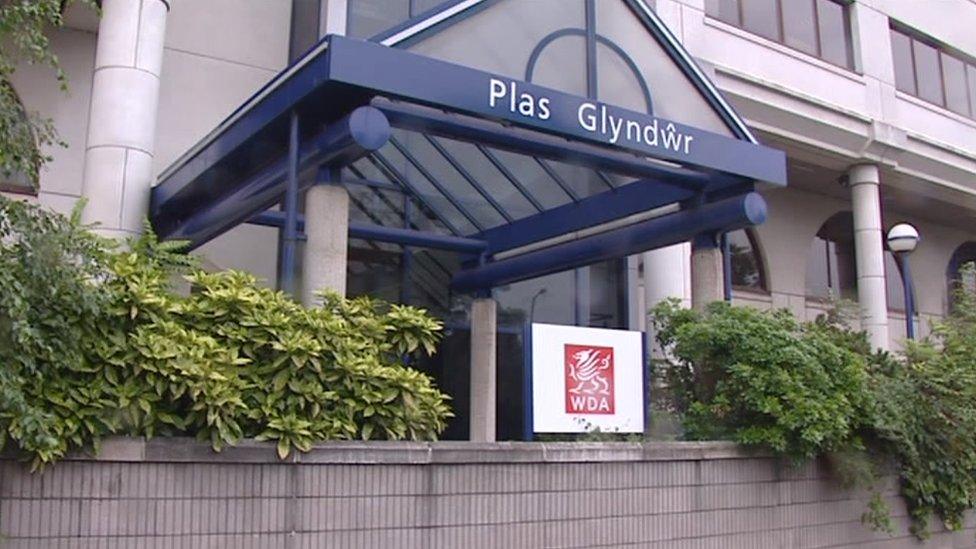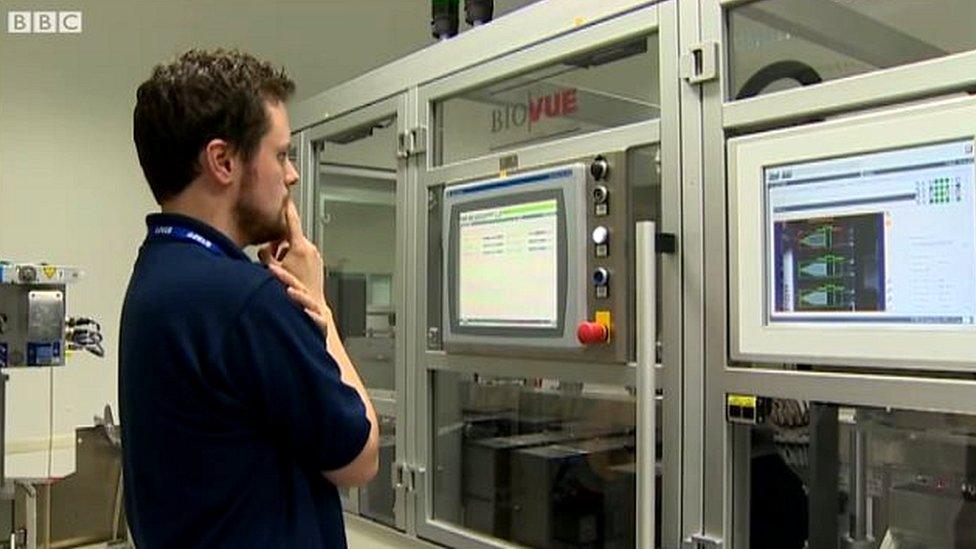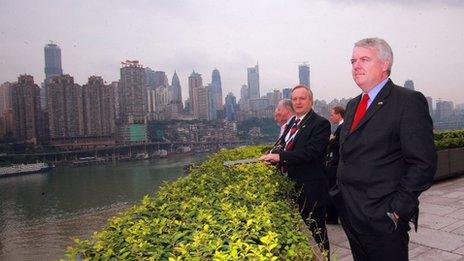Economy could be boosted by new WDA, Plaid Cymru says
- Published

The WDA was absorbed into the Welsh government 30 years after its creation
A Plaid Cymru government would revive the Welsh Development Agency brand to attract more companies to invest in Wales, the party has announced.
Set up in 1976 as a job creation agency, it became part of the Welsh government in 2006 as part of Rhodri Morgan's "bonfire of the quangos".
In 2012, MPs said that decision had "reduced Wales' visibility overseas".
Economy spokesman Rhun ap Iorwerth said Plaid would revive the name for a new public-private partnership.
He said the WDA remained a recognised global brand, and a Plaid-run Welsh government would create a new organisation using the same branding.
But the new body would "not be an exact replica", the Ynys Mon AM added, run at arms-length from government.
"Wales has been a world-class economic force before but over recent decades our economy has been in decline," Mr ap Iorwerth said.
Rhun ap Iorwerth says a new WDA would have 'private sector vigour'
"Plaid Cymru's long-term economic objective is to improve the Welsh economy to the same level within a generation.
"We need not be the poor relation of the UK."
In 2012 the Commons Welsh Affairs Select Committee called the WDA's 1980s and 1990s heyday a "golden age", when Wales accounted for 15% of investment into the UK.
The Welsh Conservatives have already called for a privately-run Investment Council to be created in order to attract overseas companies to Wales.
Tory leader Andrew RT Davies dismissed Plaid Cymru's plan, saying Wales needed "more than a retro rebrand".
"We have long championed the need for an arm's length body to lead on inward investment, but it's not as simple as attempting to recreate the halcyon days of the WDA," he said.
"The Welsh government also needs a greater focus on investor aftercare, to ensure that when companies locate in Wales they choose to stay here after the initial agreements have expired."
A Welsh government spokesman said the WDA "had run its course and was not fit for the future".
"Today we are able to be more flexible and responsive to the needs of business and international investors, an approach that is clearly reaping rewards for Wales," he added.


Ortho-Clinical Diagnostics is a US inward investment firm with 350 workers in Pencoed, Bridgend
Analysis by Sarah Dickins, BBC Wales economics correspondent
Plaid Cymru reminds us that in the 1980s, Wales' Gross Value Added (GVA - how much money is generated through goods produced and services delivered) was significantly closer to the UK average.
That may be true but that was when there were more than 20 collieries in Wales and a steel industry much larger than it is now. Both industries made a considerable impact on GVA .
Those of us who had personal experience of the WDA will have noted Rhun ap Iorwerth's use of the term "world class" . That was a phrase used weekly by the WDA.
The proposal to revive the agency in a new form is something that many in the private sector have been quietly calling for.
It will be welcomed by some but dismissed by those who feel some of its leaders became too powerful and stepped beyond the realm of how a government agency should behave, albeit at arms length.
For those who do not remember, the WDA was made up of an interesting mix of people with experience in business and in the public sector.
It was praised for "putting Wales on the map" for international business and for Wales punching well above its weight in terms of inward investment.
But it needs to be remembered that a high proportion of the foreign firms, particularly those from Asia, came to Wales in the 1990s to be part of the expanding European single market.
The likes of Sony and Panasonic had build strong consumer brands and wanted to supply from within Europe where they had strong markets rather face hurdles as importers.
They chose the UK because we speak English, while Wales often beat the Midlands, the North East and Scotland because we were cheaper, generous with grants and had a loyal, semi-skilled workforce.
We are in a very different economic climate now. Wales is now doing relatively well in terms of attracting investment from foreign firms after a few years of bad performance.
Inward investment during the WDA's latter years provided jobs for the thousands who had lost work in traditional industries like coal and steel.
Now there is more debate about how much Wales should depend on inward investment. It may bring employment but there are sometimes concerns about the quality of those jobs.
The highest paid work - accountants, company lawyers and, brand developers - are usually outside Wales and it is to the firms' headquarters, not on Welsh soil, that profits flow.
With 5% of the UK population, Wales generates only 3.4% of the economic activity.
By proposing a new form of WDA, Plaid Cymru will win some support from those who feel the Welsh government doesn't always see opportunities and risks in the way businesses tend to.
But when global economies that Wales trades with are slowing down, many others will scratch their heads as to how Wales can narrow the gap with the UK average in a generation.
- Published9 December 2015

- Published23 January 2014

- Published21 February 2012
